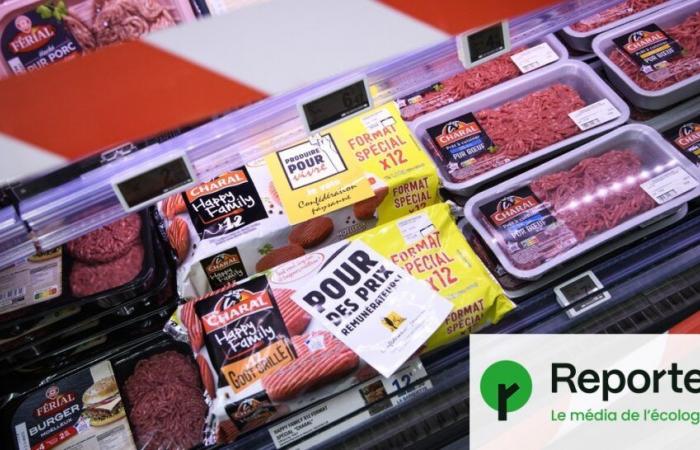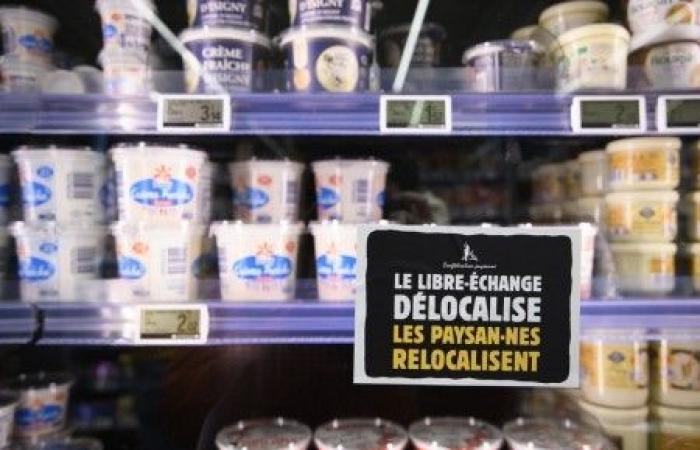Hand in hand, big smiles. The photo immortalizes the President of the European Commission, Ursula von der Leyen, and the presidents of Brazil, Uruguay, Argentina and Paraguay. Everyone welcomed, on December 6, the conclusion of negotiations for the free trade agreement between the European Union and Mercosur, an alliance of Latin American countries.
Although there are several steps remaining before the definitive signing of the controversial text, its implementation is fast approaching. What consequences could it have on our plates? ? Reporterre takes stock.
• More imported beef and chicken
The agreement consists of lowering or even eliminating customs duties on a certain number of products. On beef, 99,000 tonnes can be imported with a duty reduced to 7.5 %, to which is added a quota of 45,000 tonnes on which no customs duties will apply. That's as much meat as can enter the European Union « at lower prices »explains Marine Colli, independent consultant specializing in the agreement.
The European Commission calculated that this would only reduce 0.7 to 1.2 % European beef production. But « these ratios do not make much sense, it is not whole carcasses that are sent to Europe, but sirloin — rump steak, fillet, sirloin »recalls the expert. Competition would therefore take place in this market segment where prices are high, and for which European production amounts to « 400,000 tonnes »she believes. The total quota of 144,000 tonnes of beef provided for by the agreement therefore corresponds more to 36 % of European sirloin production. A significant figure, which further increases low-price competition with European producers, and the risk of finding this meat on our plates.
For the moment, in France, Mercosur beef is still not very present. « It is mainly found in the commercial catering segment.indicates Marine Colli. Restaurant owners have an obligation, in theory, to display the origin of the meat, but this is poorly respected. »
At the end of the treaty negotiations, Ursula von der Leyen with, from left. to right. : Presidents Javier Milei (Argentina), Luis Alberto Lacalle Pou (Uruguay), Lula (Brazil) and Santiago Peña Palacios (Paraguay).
X/Ursula von der Leyen
On the poultry side, the scenario is similar: many fillets, the most expensive part, are imported. 180,000 tonnes would be entitled to reduced or eliminated customs duties. This meat is found « more in processed productscontinues Marine Colli, and there is really a hole in the racket in European regulations ».
There is no obligation to indicate the origin of the meat for this type of product, such as nuggets or cordon bleu. « When Carrefour [ou Intermarché] announces that there will be no meat from Mercosur on its shelves, it does not in fact have the means to verify this for processed products »she notes.
• From meat to hormones and antibiotics
Ursula von der Leyen wanted to reassure on December 6. « We have negotiated robust safeguard clauses to protect your income »she promised the farmers. And our « standards remain untouchable ». « Guarantees ? There is nonereplies Karine Jacquemart, general director of the consumer association Foodwatch. We already trade food with these countries, there are already problems, and they will increase. »
For example, imports into Europe of beef treated with a growth hormone, estradiol 17β, are prohibited. « This hormone is carcinogenic »recalls Foodwatch. However, a report from the European Commission published last October noted that current controls to verify that Brazilian hormone-treated beef is not exported to us « are ineffective ». « It is likely that our imports already expose us to this banned hormonethinks Karine Jacquemart. With this treaty, we increase volumes and expose ourselves even more to the problem ! »
« These substances have not been banned
with us by chance »
Another example, it is perfectly legal to import into our country meat treated with antibiotics, used as growth promoters. « It is a routine practice in Brazil, while it has been banned in the European Union since 2006.says Marine Colli. We have here a real distortion of production standards between European and American breeders, with a real public health issue, because this practice contributes to the development of antibiotic resistance. »
• Banned pesticides returning to theUE
The agreement does not only concern meat, it also plans to facilitate the importation into Europe of 180,000 tonnes of sugar. A crop massively sprayed with pesticides banned in the European Union recently showed an international investigation by journalists.
Some plantations are cultivated by the French group Tereos, others supply Nestlé. « These substances were not banned here by chance. We increase the risk of finding residues on our plates »specifies Karine Jacquemart.
Some of these pesticides banned in theUE continue to be produced… in France, in particular, to be exported. And Brazil is the main recipient. The agreement UE-Mercosur expects an increase in these exports. It therefore risks increasing the exposure of American and European populations to these substances, which are considered too dangerous to be used in Europe. A beautiful « boomerang effect »denounces Karine Jacquemart.
• Even moreGMO to feed our flocks
As an indirect consequence on our plates, the treaty promises to have effects on the feed given to livestock raised in the European Union. The agreement notably provides for an increase in corn imports. The general association of corn producers is upset.
According to the report produced by the organization, 180,000 tonnes of corn intended to feed European poultry could be imported without customs duties. It would be almost all corn GMO treated with pesticides banned in Europe.
« Of the 178 active substances authorized on corn in Brazil and Argentina, 92 are banned in Europenotes the document. This share is even higher across France: 138 active substances out of the 178 authorized in Brazil and Argentina are prohibited. […]. » 77,5 % of active substances authorized for Mercosur producers are thus prohibited in France. Among them, atrazine, banned in France for more than twenty years, or neonicotinoids.
However, although the negotiations are over, the treaty has not yet been signed, recalls Karine Jacquemart: « We can still avoid the worst. I hope that we will achieve a rejection either by the European Council or by the European Parliament. »
legend







